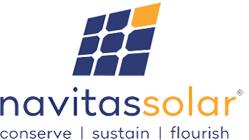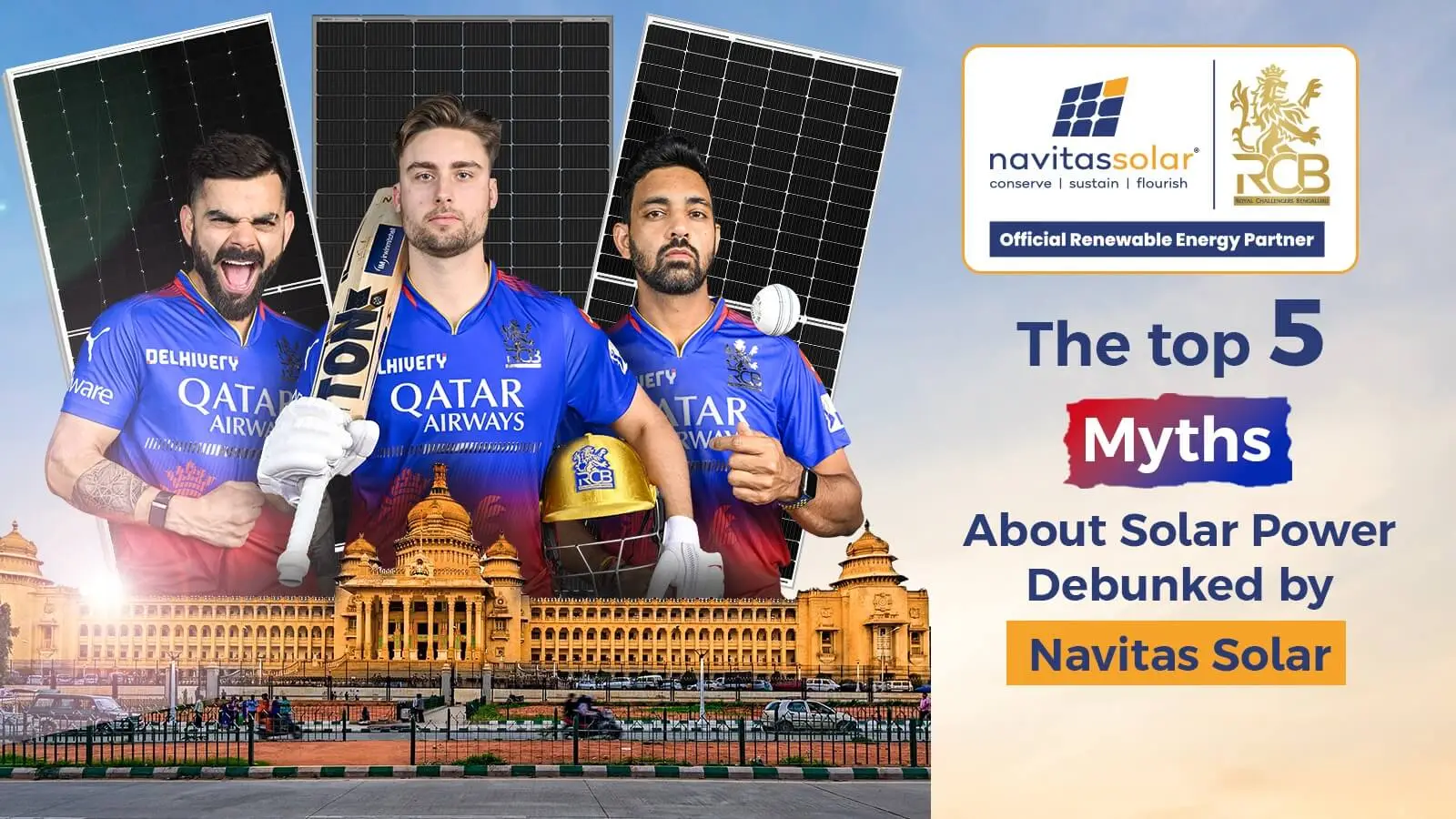June 19, 2024
The Top 5 Myths About Solar PowerDebunked by Navitas Solar
There is a ton of information out there on switching to solar power, including myths. We understand there are many confusing opinions and statistics. Therefore, in this blog, we are going to discuss some of the most common solar power myths in India. Navitas Solar is a solar panel manufacturer based in Surat. We have been working in the
industry for a decade, helping people embrace the beauty of solar energy. Our interest lies in helping communities get the best form of sustainable energy. With our years of experience and
expertise, we can help you debunk solar myths.
The supporting solar system elements like the battery, wires, converter, and earthing tools tend to add up to the cost of installation. Nowadays, there are good affordable alternatives available without compromising the quality.
Government subsidies for the manufacturers also reduce the cost. Additionally, these solar panels last for 25 – 30 years. It results in long-term benefits for the initial installment cost. Government incentives also help you save some taxes to encourage people to switch to sustainable energy.
Table of Contents
Toggle5 Solar Power Myths In India
Myth 1: Solar power Installation is EXPENSIVE!
One of the most common myths is that installing solar power is expensive. It might have been the case before, but with advances in tech, it is now cheaper than ever. Government incentives have also facilitated solar panel installation cost reduction.The solar panel itself, generally was the expensive part of the whole solar system. The single silicon crystal making the solar cell or PV increases the price significantly. These cells generate power in Kilo Watt. Now, there are cells made from fragments of silicons, reducing the cost of the panels.The supporting solar system elements like the battery, wires, converter, and earthing tools tend to add up to the cost of installation. Nowadays, there are good affordable alternatives available without compromising the quality.
Government subsidies for the manufacturers also reduce the cost. Additionally, these solar panels last for 25 – 30 years. It results in long-term benefits for the initial installment cost. Government incentives also help you save some taxes to encourage people to switch to sustainable energy.
Myth 2: Solar Power doesn’t work on rainy days
As the monsoon is a big season in India, people think solar energy cannot be harvested during this season, wondering, how will sun energy become electric energy if there is no sun at all? Sure, solar power production indeed reduces on rainy and cold days. But it doesn’t entirely stop. The solar panel works in sunlight and not sunheat. So even if the weather is cloudy, even if there is slight sunlight the solar power is functional. However, with low sunlight, the productivity of the panel reduces. It will produce less energy due to less sunlight. But, you can also rely on batteries to store excess energy in high productivity hours.Myth 3: Solar Power is unstable
Solar power is often categorized as unstable or unreliable. It turns out to be the biggest cons. Fortunately, it’s not the case. Solar power is dependent on sunlight, but you can also store the electricity produced by the solar panel in the batteries. So, you do have energy when there is no sunlight or when there is a power outage. Additionally, you can opt for a grid solar system. Here, you connect your solar system with your local electric supplier. Depending on the solar energy supply and electricity requirements, you can switch between solar power and electric power. It helps you reduce the electric consumption from your local supplier and assures continuous electric supply.Myth 4: Solar power system maintenance is a tedious task
Cleaning is a chore, not the most exciting one at that. Getting on a rooftop for this chore makes it even worse. However, you don’t have to climb on your rooftop for regular cleaning. You can rely on the solar system company for regular checkups and cleaning, once or twice a year. Yup, that’s all the maintenance a solar system needs. In areas experiencing heavy snowing or rain, there might be some need to clean the solar panels. But, it is minimal, and most of the time it dries off on its own.Myth 5: You need a large space to install solar panels
Solar panel depends on the solar cell converting light energy into electric energy. These cells have a kilo-watt power to convert the energy. There are varying types of solar cells producing different ranges of watt energy. This energy may range from 250-400 watts. A solar cell with high-watt energy conversion will reduce the number of solar panels you might need, and vice versa. Thus, if you have a small space you can opt for high voltage solar panels. But, it is important to note that higher-voltage solar cells are expensive. Okay, but how do I know what voltage is suitable for me? First, you need to estimate your electric unit usage. Check your electricity bill to track your average and most electric unit consumption. It will give you an idea of how much electricity you will need. Depending on these numbers, you can select the panel with a voltage that’ll produce electricity to suffice your needs.Conclusion
We have come across an immeasurable amount of myths regarding solar energy. Yet, the ones mentioned above were the most frequently asked. The financial burden and instability of thesolar power system are primary concerns. The solar energy converts sunlight energy into clean electric energy. So, even in low sunlight, you can enjoy the clean energy. The government is promoting the use of clean energy to save natural resources by providing subsidies, reducing the cost. Maintenance is a rightful concern of installing solar systems. But, system maintenance once a year by the company assures you smooth usage. The number of solar panels needed is also a concern. Depending on the voltage of the solar cell of the panel, you can reduce the number of solar panels you might need. The solar system saves you money and resources in the long run, thus being the perfect choice to lead a better life.FAQs
What are the benefits of solar energy panels?
Solar energy panels help you convert sunlight energy into electric energy. It is clean energy, meaning there is no waste or harmful emission from this energy production. There are many benefits of using solar energy as mentioned below:- It can be built at any location exposed to sunlight
- It saves natural resources
- It gives clean electric energy that is sustainable
- It reduces your electricity bill to almost nill
- It increases the value of your property
- It suffices your energy usage at a low cost


 Online | Privacy policy
Online | Privacy policy
Related Posts
You May Also Like
Bonito Series: Driving Innovation in…
Read MoreTOPCon Series: The Next Generation…
Read MoreValuable Points to Remember During…
Read MoreNavitas Planet Partners with Hysolwin…
Read MoreDriving Towards a Sustainable Future:…
Read MoreWhy Do Top-Grade EVA Sheets…
Read MoreBonito Series: Driving Innovation in…
Read MoreTOPCon Series: The Next Generation…
Read MoreValuable Points to Remember During…
Read MoreNavitas Planet Partners with Hysolwin…
Read MoreDriving Towards a Sustainable Future:…
Read MoreWhy Do Top-Grade EVA Sheets…
Read MoreBonito Series: Driving Innovation in…
Read MoreTOPCon Series: The Next Generation…
Read MoreValuable Points to Remember During…
Read MoreNavitas Planet Partners with Hysolwin…
Read More